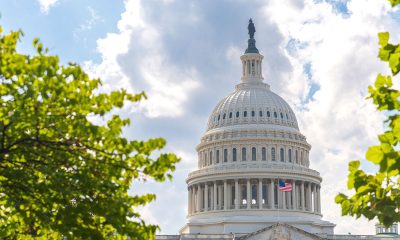Crime
House Chairs Tell Barr They Expect Mueller Report to Be Made Public
NNPA NEWSWIRE — Today, the chairs of six committees in the U.S. House of Representatives wrote to Attorney General William Barr to inform him of their expectation that he will make Special Counsel Robert Mueller’s report public “without delay and to the maximum extent permitted by law.”
WASHINGTON — Today, the chairs of six committees in the U.S. House of Representatives wrote to Attorney General William Barr to inform him of their expectation that he will make Special Counsel Robert Mueller’s report public “without delay and to the maximum extent permitted by law.” The letter follows news reports that suggest the Special Counsel investigation is nearing an end.
The letter was signed by House Committee on Financial Services Chairwoman Maxine Waters, Judiciary Committee Chairman Jerrold Nadler, Committee on Oversight and Reform Chairman Elijah E. Cummings, Permanent Select Committee on Intelligence Chairman Adam B. Schiff, Committee on Ways and Means Chairman Richard E. Neal and Committee on Foreign Affairs Chairman Eliot L. Engel.
Full text of the letter is available here and below.
February 22, 2019
The Honorable William P. Barr
Attorney General
U.S. Department of Justice
950 Pennsylvania Avenue, N.W.
Washington, D.C. 20530Dear Mr. Attorney General:
Recent reports suggest that Special Counsel Robert Mueller may be nearing the end of his investigation into “any links and/or coordination between the Russian government and individuals associated with the campaign of President Donald Trump” and other matters that may have arisen directly from the investigation.[1] As you know, Department of Justice regulations require that, “[a]t the conclusion of the Special Counsel’s work, he or she shall provide the Attorney General with a confidential report explaining the prosecution or declination decisions reached by the Special Counsel.”[2]
After nearly two years of investigation—accompanied by two years of direct attacks on the integrity of the investigation by the President—the public is entitled to know what the Special Counsel has found. We write to you to express, in the strongest possible terms, our expectation that the Department of Justice will release to the public the report Special Counsel Mueller submits to you—without delay and to the maximum extent permitted by law.
There also remains a significant public interest in the full disclosure of information learned by the Special Counsel about the nature and scope of the Russian government’s efforts to undermine our democracy. To the extent that the Department believes that certain aspects of the report are not suitable for immediate public release, we ask that you provide that information to Congress, along with your reasoning for withholding the information from the public, in order for us to judge the appropriateness of any redactions for ourselves.
We also expect that the Department will provide to our Committees, upon request and consistent with applicable law, other information and material obtained or produced by the Special Counsel regarding certain foreign actors and other individuals who may have been the subject of a criminal or counterintelligence investigation. This expectation is well-grounded in the precedent set by the Department in recent years. In other closed and pending high-profile cases alleging wrongdoing by public officials, both the Department and the FBI have produced substantial amounts of investigative material, including classified and law enforcement sensitive information, to the House of Representatives.
Finally, although we recognize the policy of the Department to remain sensitive to the privacy and reputation interests of individuals who will not face criminal charges,[3] we feel that it is necessary to address the particular danger of withholding evidence of misconduct by President Trump from the relevant committees.
If the Special Counsel has reason to believe that the President has engaged in criminal or other serious misconduct, then the President must be subject to accountability either in a court or to the Congress. But because the Department has taken the position that a sitting President is immune from indictment and prosecution,[4] Congress could be the only institution currently situated to act on evidence of the President’s misconduct. To maintain that a sitting president cannot be indicted, and then to withhold evidence of wrongdoing from Congress because the President will not be charged, is to convert Department policy into the means for a cover-up. The President is not above the law.
Thank you for your consideration.
[1] Appointment of Special Counsel to Investigate Russian interference with the 2016 Presidential Election and Related Matters, Order No. 3915-2017, Office of the Deputy Attorney General, May 17, 2017.
[2] 26 C.F.R. § 600.8(c).
[3] See, e.g., United States Attorneys’ Manual 9-27.790 and 9-11.130.
[4] See Memorandum from Robert G. Dixon, Jr., Assistant Attorney General, Office of Legal Counsel, Amenability of the President, Vice President, and Other Civil Officers to Federal Criminal Prosecution while in Office (Sept. 24, 1973).
Activism
Oakland Post: Week of December 24 – 30, 2025
The printed Weekly Edition of the Oakland Post: Week of – December 24 – 30, 2025

To enlarge your view of this issue, use the slider, magnifying glass icon or full page icon in the lower right corner of the browser window.
Alameda County
Oakland Council Expands Citywide Security Cameras Despite Major Opposition
In a 7-1 vote in favor of the contract, with only District 3 Councilmember Carroll Fife voting no, the Council agreed to maintain its existing network of 291 cameras and add 40 new “pan-tilt-zoom cameras.”

By Post Staff
The Oakland City Council this week approved a $2.25 million contract with Flock Safety for a mass surveillance network of hundreds of security cameras to track vehicles in the city.
In a 7-1 vote in favor of the contract, with only District 3 Councilmember Carroll Fife voting no, the Council agreed to maintain its existing network of 291 cameras and add 40 new “pan-tilt-zoom cameras.”
In recent weeks hundreds of local residents have spoken against the camera system, raising concerns that data will be shared with immigration authorities and other federal agencies at a time when mass surveillance is growing across the country with little regard for individual rights.
The Flock network, supported by the Oakland Police Department, has the backing of residents and councilmembers who see it as an important tool to protect public safety.
“This system makes the Department more efficient as it allows for information related to disruptive/violent criminal activities to be captured … and allows for precise and focused enforcement,” OPD wrote in its proposal to City Council.
According to OPD, police made 232 arrests using data from Flock cameras between July 2024 and November of this year.
Based on the data, police say they recovered 68 guns, and utilizing the countywide system, they have found 1,100 stolen vehicles.
However, Flock’s cameras cast a wide net. The company’s cameras in Oakland last month captured license plate numbers and other information from about 1.4 million vehicles.
Speaking at Tuesday’s Council meeting, Fife was critical of her colleagues for signing a contract with a company that has been in the national spotlight for sharing data with federal agencies.
Flock’s cameras – which are automated license plate readers – have been used in tracking people who have had abortions, monitoring protesters, and aiding in deportation roundups.
“I don’t know how we get up and have several press conferences talking about how we are supportive of a sanctuary city status but then use a vendor that has been shown to have a direct relationship with (the U.S.) Border Control,” she said. “It doesn’t make sense to me.”
Several councilmembers who voted in favor of the contract said they supported the deal as long as some safeguards were written into the Council’s resolution.
“We’re not aiming for perfection,” said District 1 Councilmember Zac Unger. “This is not Orwellian facial recognition technology — that’s prohibited in Oakland. The road forward here is to add as many amendments as we can.”
Amendments passed by the Council prohibit OPD from sharing camera data with any other agencies for the purpose of “criminalizing reproductive or gender affirming healthcare” or for federal immigration enforcement. California state law also prohibits the sharing of license plate reader data with the federal government, and because Oakland’s sanctuary city status, OPD is not allowed to cooperate with immigration authorities.
A former member of Oakland’s Privacy Advisory Commission has sued OPD, alleging that it has violated its own rules around data sharing.
So far, OPD has shared Flock data with 50 other law enforcement agencies.
Activism
Oakland Post: Week of December 17 – 23, 2025
The printed Weekly Edition of the Oakland Post: Week of – December 17 – 23, 2025

To enlarge your view of this issue, use the slider, magnifying glass icon or full page icon in the lower right corner of the browser window.
-

 Alameda County4 weeks ago
Alameda County4 weeks agoSeth Curry Makes Impressive Debut with the Golden State Warriors
-

 Bay Area2 weeks ago
Bay Area2 weeks agoPost Salon to Discuss Proposal to Bring Costco to Oakland Community meeting to be held at City Hall, Thursday, Dec. 18
-

 #NNPA BlackPress4 weeks ago
#NNPA BlackPress4 weeks agoFBI Report Warns of Fear, Paralysis, And Political Turmoil Under Director Kash Patel
-

 Activism2 weeks ago
Activism2 weeks agoMayor Lee, City Leaders Announce $334 Million Bond Sale for Affordable Housing, Roads, Park Renovations, Libraries and Senior Centers
-

 Activism3 weeks ago
Activism3 weeks agoOakland Post: Week of December 10 – 16, 2025
-

 Arts and Culture2 weeks ago
Arts and Culture2 weeks agoFayeth Gardens Holds 3rd Annual Kwanzaa Celebration at Hayward City Hall on Dec. 28
-

 Activism2 weeks ago
Activism2 weeks agoOakland School Board Grapples with Potential $100 Million Shortfall Next Year
-

 Activism2 weeks ago
Activism2 weeks ago2025 in Review: Seven Questions for Black Women’s Think Tank Founder Kellie Todd Griffin


























































